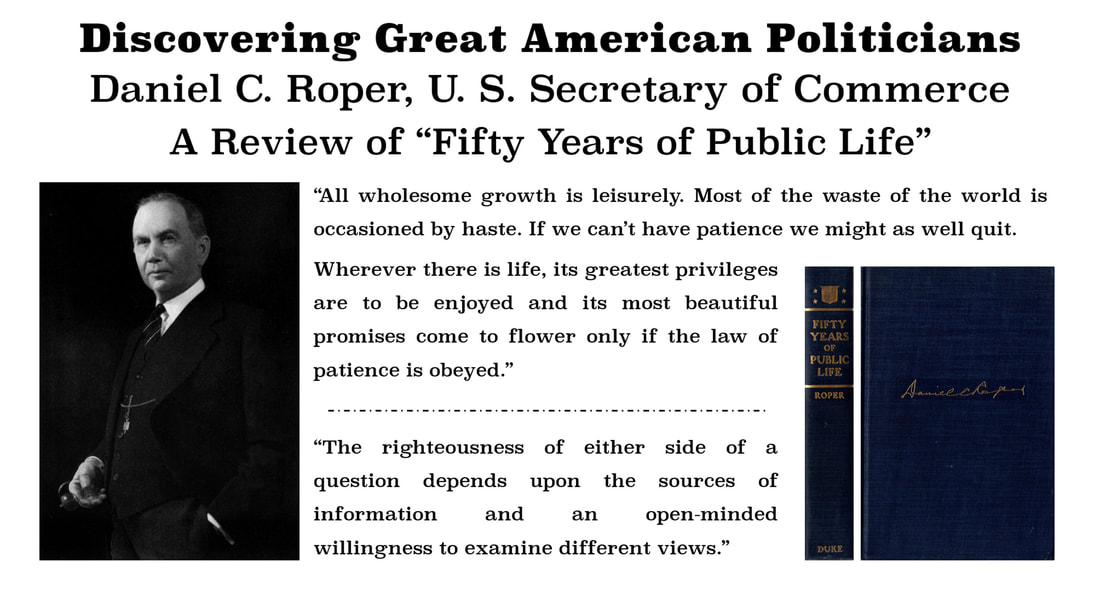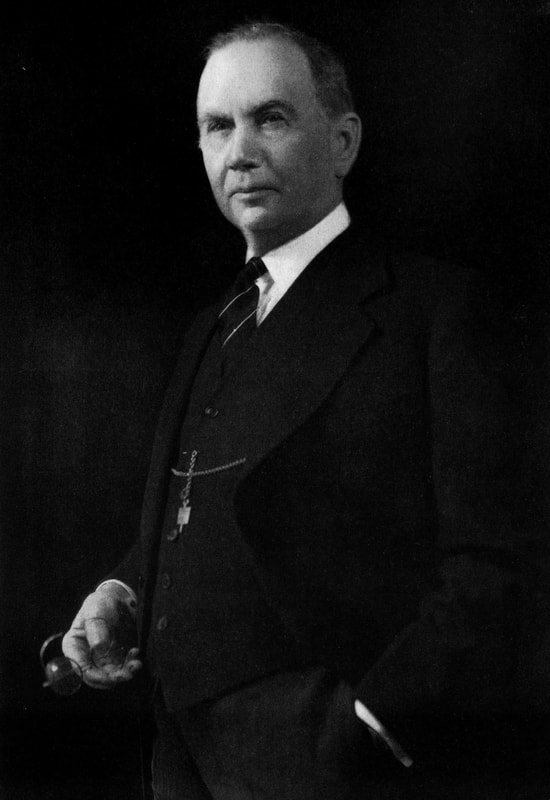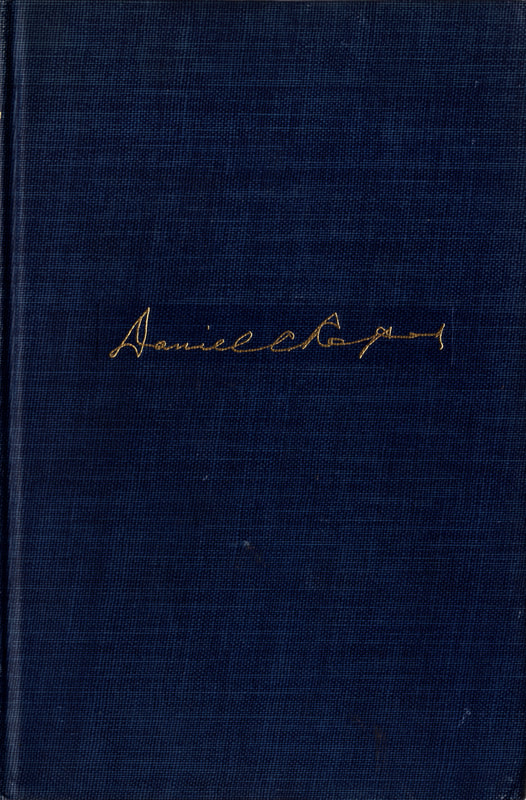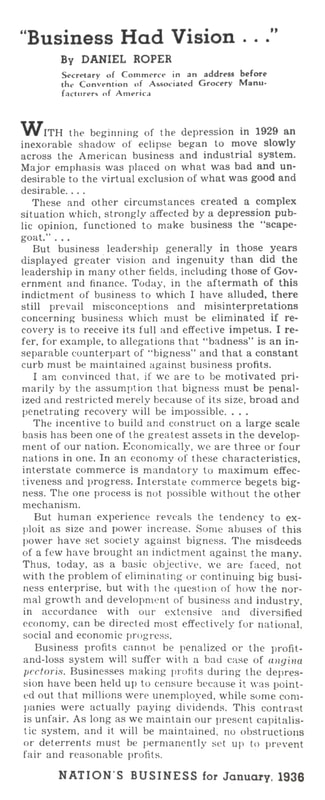A Review of "Fifty Years of Public Life" by Daniel C. Roper
|
|
Date Published: September 9, 2023
|
Daniel C. Roper, former United States Secretary of Commerce, died on Sunday, April 11, 1943 less than two years after publishing this autobiography on his life and documenting his fifty years of public service. He stated in the work that he had “from Reconstruction days to World War II … lived under fifteen Presidents and served under six of them.
The fact that there are minimal reviews of this book is probably the result of the timing of its release: the very month of the attack on Pearl Harbor.
The fact that there are minimal reviews of this book is probably the result of the timing of its release: the very month of the attack on Pearl Harbor.
Peter E. Greulich, September 2023
A Review of “Fifty Years of Public Life” by Daniel C. Roper
- Reviews of the Day: 1941–42
- Selected Insights from “Fifty Years of Public Life”
- This Author’s Thoughts and Perceptions
Reviews of the Day: 1941–42
As was noted above, this book was released in December 1941 just as the United States of America entered World War II. There were very few reviews, most likely because of the events of late 1941—Pearl Harbor, and early 1942.
Given that, here are the few for your consideration:
Given that, here are the few for your consideration:
|
“Whether Daniel C. Roper has been right or not, is beside the point. Here in this book is the record of what he tried to do—of what democratic processes permitted … and enabled him to do. For democracy both encourages action from above and below and places checks upon deeds.
“He saw the frightfulness of Reconstruction in South Carolina—a horror let lose upon the South by Lincoln’s assassination. … Roper lived through the hectic days of panic [the Great Depression] serving state and country, … He was close to the helm when panic was followed by the World War. … he saw WWII from Washington, in Canada, and through visits to Europe. … “Out of this rich experience, he has drawn a philosophy of life, spiritual, moral, practical, and democratic that shines from every page.” Martin Conville, “Veteran Cabinet Officer Recounts his Experiences,”
The Los Angeles Times, December 1941 |
“Daniel C. Roper has written a book that is important and entertaining … with a wealth of source material. … Of historical importance is the rather detailed story of Col. Edward M. House and his vast secret influence in shaping national events during the two administrations of Woodrow Wilson. …
“With regard to Mrs. Roosevelt he writes, ‘She is perhaps the most remarkable woman who ever occupied the White House, a student of social conditions and trends, with exceptional capacity in educational leadership.’ ”
“With regard to Mrs. Roosevelt he writes, ‘She is perhaps the most remarkable woman who ever occupied the White House, a student of social conditions and trends, with exceptional capacity in educational leadership.’ ”
Gladys Wood Daniel, “Daniel Roper Reminisces,”
The Washington D.C. Sunday Star, 1942
The Washington D.C. Sunday Star, 1942
Selected Insights from “Fifty Years of Public Life”
- A Different Perspective on John D. Rockefeller Sr.—affordability of kerosene.
“In 1877, or when I was ten, we bought our first kerosene lamp. My parents regarded it as dangerous, and they carefully warned me against having too much to do with it. … At the time we paid twenty-five cents a gallon for kerosene. I have always felt a little more kindly towards John D. Rockefeller [Sr.] because his activities brought fuel oil down to about one fourth the price it was when I was a boy.”
- A View on South Carolina at the End of the Civil War
|
“The North had recovered, but the wounds inflicted upon the South by the Civil War would not be healed for many troubled decades. … Her great problem now was the changing order, which in South Carolina meant the passing of control from the landed aristocracy to the white masses. This internal strife grew to such incendiary proportions at times that it flared forth in wholesale riots and bloodshed. …
“Accordingly, it is seen that the state was in the grip of aristocracy—a wealthy, tenacious minority implemented to rule both the white and black masses. Under this economic and political enslavement, human rights would seem to have been subordinate to property rights, as witness the qualifications for service in the state legislature. … The Civil War, however, destroyed that feudalism. “At the close of the war, according to a recent historical writer, ‘stores were closed; roads were out of repair. Charleston was a city of ruins, of desolation, of vacant houses, of widowed women, of deserted warehouses and of wharves overgrown with rank weeds.’ … "Slaves and Confederate bonds had become worthless, and land had fallen to one third of its former value.” |
Front Cover of Daniel C. Roper's "Fifty Years of Public Life."
|
- On Harmonizing Different Perspectives in Human Nature
“Interpretation of truth, or the righteousness of either side of a question depended upon the sources of information and an open-minded willingness to examine different views.”
– Daniel Roper’s Perspective on the post-Civil War Negro as a Role Model in his Life
“I had always been encouraged by the unshakable philosophy of the Negro and stirred by the charm of his music. If at any point the Negro had been dropped from my life, I would have been poorer. My association with him, seeing his noble adjustment to a humble role, had helped me to undertake my hardest tasks.
“If in some respects I had failed, it was doubtless due in part to my forgetting his philosophy and hopeful attitude.”
“If in some respects I had failed, it was doubtless due in part to my forgetting his philosophy and hopeful attitude.”
- Daniel Roper’s Perspective on the Usage of Calumny in Politics
“The answer [using calumny against a political office holder to win an election] struck me with the vileness of perverting the truth in a democracy. Maybe such tactics were suitable to the old world and its intrigues and political machinations, but a democracy needed to be founded on truth, and any effort to deceive the people was inimical to our form of government, whether in national campaigns or in group or individual dealings.”
This Author's Thoughts and Perceptions
Upon the announcement that Daniel C. Roper had finished his manuscript for his “Fifty Years of Public Life,” one press article summarized Mr. Roper’s life of public services as follows:
|
“The former commerce secretary, who began his public career as a member of the South Carolina State House of Representatives in 1892, was first-assistant postmaster general from 1913 to 1916, organizer of Woodrow Wilson campaign in 1916, … collector of the Internal Revenue Service in 1917, Secretary of Commerce for FDR’s cabinet in 1932, … and concluded his long period of public life as United States Minister to Canada.”
“Surveys 50 Years in Public Life,” LeGette Blythe,
The Charlotte Observer, 1941 This is an amazing record of service.
|
World War II started as this book was published.
|
- A Sincere and Thoughtful Autobiography
This autobiography brings across the openness, discipline, and integrity of Daniel C. Roper. Because of this, it was easy for me to internalize one principle: In my beliefs, always keep an open mind and an open heart to the perspectives of others.
|
Although I did not agree with some of his over-generalizations about a few corporations under the control of some less-than-honorable industrialists and their long-term effect on capitalism, he appears from this autobiography that he would have been open to discussion about those generalizations. [After writing this review, I came across the article—now included as a sidebar—that Daniel C. Roper wrote for Nation's Business in 1936 entitled "Business Had Vision." This article supports my belief that he was open to discussion and shows his balanced approach to government and business … although he doesn't get into specifics in anything I have read in this book or since.]
This came across because if there was one component lacking in Mr. Roper’s education--to give him a wider perspective, it was that of being an actual industrialist during the Great Depression. An individual who needed to pay dividends to shareholders, build, to distribute and sell higher-quality products at lower prices to customers, to increase sales productivity to improve employees’ wages while maintaining full employment, and to contribute as an individual and a corporation to the immediate welfare of local, state, national, and international communities. It was an overwhelming task that many industrialists did take on—and succeeded at in the face of socialism, anarchy, and fascism. His perceptions in the business areas sometimes come across as that of an on-the-job trained government official but with an unquestionable integrity and with an ability matched by a deep desire and practice to summon the best and brightest of both government and industry to the conference table. The Business Activity Council (BAC) was the result and Thomas J. Watson Sr. was a member of the council from the beginning. This was the reason I read this book. |
An article by Mr. Roper displaying a balance about business and profits.
|
Yet, because of Roper’s lack of an on-hands experience at the top of a business concern (vs. a government institution) he, through no fault of his own, just doesn’t come across as able to understand those who ran a business in a legitimate, open-minded manner. There were so many ways that business at that time tried to help through individuals like Gerard Swope and Owen D. Young of General Electric, Thomas J. Watson Sr. of IBM, George F. Johnson of Endicott-Johnson Corporation and others. Again, this was not the purpose of the book, but the lack of this information—even in the smallest degree—seems to betray a lack of knowledge about their efforts.
Mr. Roper thoroughly convinced me of his sincerity and integrity (some of which I hope I have) and yet, because he hadn’t worn the mantle of an employer meeting employee payrolls and filling the government’s coffers, he didn’t quite expose this side of the story … but, again, that was not the purpose of the book.
Mr. Roper thoroughly convinced me of his sincerity and integrity (some of which I hope I have) and yet, because he hadn’t worn the mantle of an employer meeting employee payrolls and filling the government’s coffers, he didn’t quite expose this side of the story … but, again, that was not the purpose of the book.
I get it.
- We Forgive Thoughtful Mistakes
In an autobiography, I like to see an author discuss the mistakes that they made and what they learned from them. Because of the lack of these in the book, it seemed that Mr. Roper was successful at everything he did and tried. When a well-known figure writes an autobiography doesn’t a little discourse on their mistakes help humanize them and help a reader relate to their experiences?
Roper does come across wonderfully—and very believable, in this book … but Pulitzer prize winning material is more about revealing the whole man and his struggles, his failures--and his failed wishes as well as his victories. Andrew Carnegie does a wonderful job of introspection in his "Autobiography of Andrew Carnegie;" Samuel Morison accomplishes the same in his Pulitzer Prize winning biography on Christopher Columbus, "Admiral of the Ocean Sea."
A biographer—even in an autobiography, should reveal individual weaknesses—cause, effect and outcome, and let the reader learn from them.
This is still a strong read about a political man of honesty and integrity.
Could use a few more Daniel C. Roper’s today.
Cheers,
- Peter E.
Roper does come across wonderfully—and very believable, in this book … but Pulitzer prize winning material is more about revealing the whole man and his struggles, his failures--and his failed wishes as well as his victories. Andrew Carnegie does a wonderful job of introspection in his "Autobiography of Andrew Carnegie;" Samuel Morison accomplishes the same in his Pulitzer Prize winning biography on Christopher Columbus, "Admiral of the Ocean Sea."
A biographer—even in an autobiography, should reveal individual weaknesses—cause, effect and outcome, and let the reader learn from them.
This is still a strong read about a political man of honesty and integrity.
Could use a few more Daniel C. Roper’s today.
Cheers,
- Peter E.
Image of the spine of Daniel C. Roper's "Fifty Years of Public Life."





